A Report on Health Issues: Mental Health, Gender, Age, and Ethnicity
VerifiedAdded on 2023/06/16
|9
|2718
|473
Report
AI Summary
This report examines mental health service provision, focusing on older adults and the age-related inequities they face. It discusses the challenges in accessing mental healthcare, the societal inequalities that contribute to these disparities, and the extent of health inequities in mental health services for older people. The analysis includes a review of existing policies and legislation in the United Kingdom aimed at addressing these inequities, such as the Mental Health Act (1983) and improved access to psychological therapies. Furthermore, the report identifies gaps in current policies, particularly the lack of specific attention to the needs of older adults and the insufficient integration of physical and mental healthcare. To address these gaps, the report suggests strategies like investigating successful policies in mental health trusts, changing attitudes in healthcare, establishing benchmarks for treatment, and providing targeted interventions and support for older people and their caregivers. Desklib offers a wealth of similar solved assignments and resources for students.
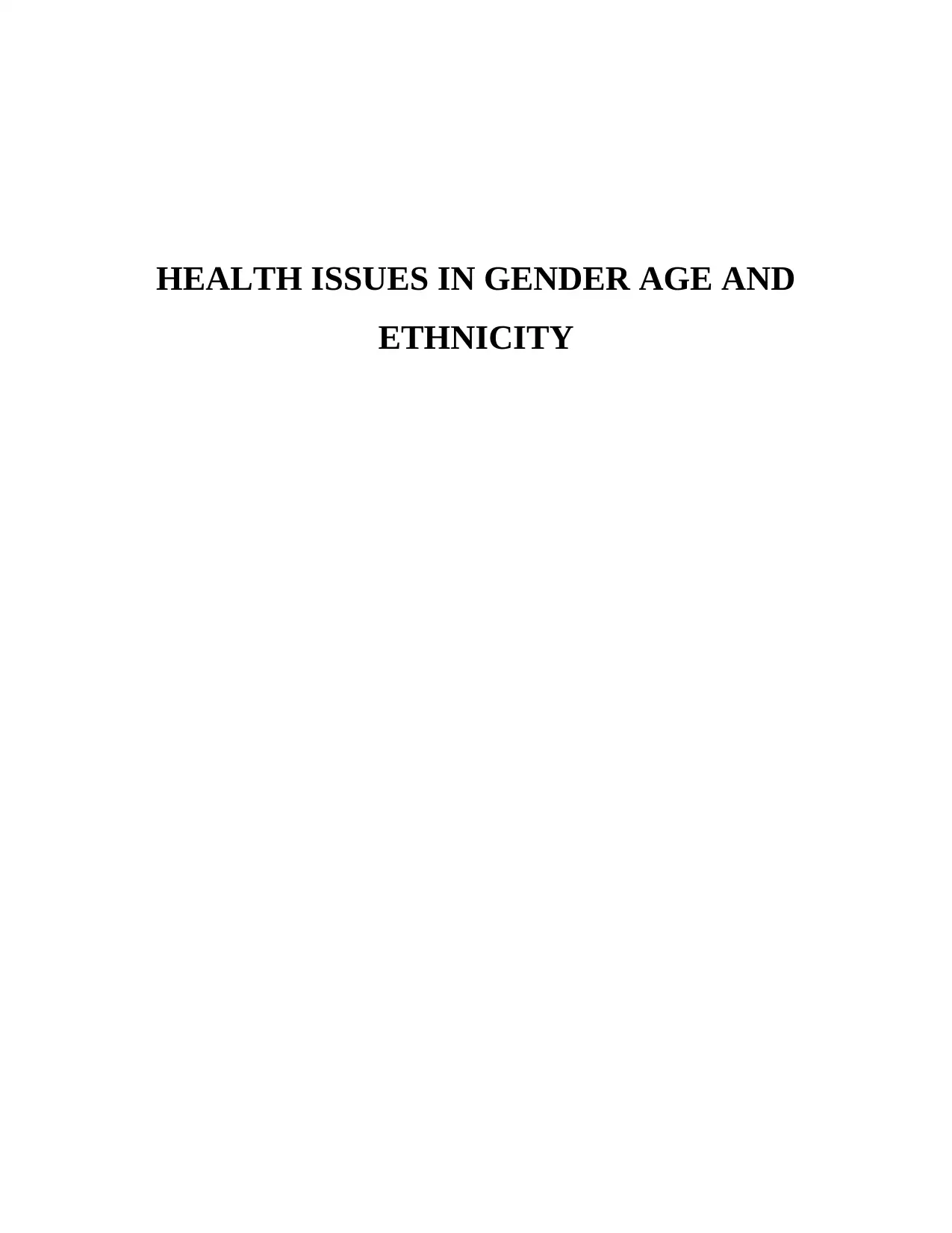
HEALTH ISSUES IN GENDER AGE AND
ETHNICITY
ETHNICITY
Paraphrase This Document
Need a fresh take? Get an instant paraphrase of this document with our AI Paraphraser
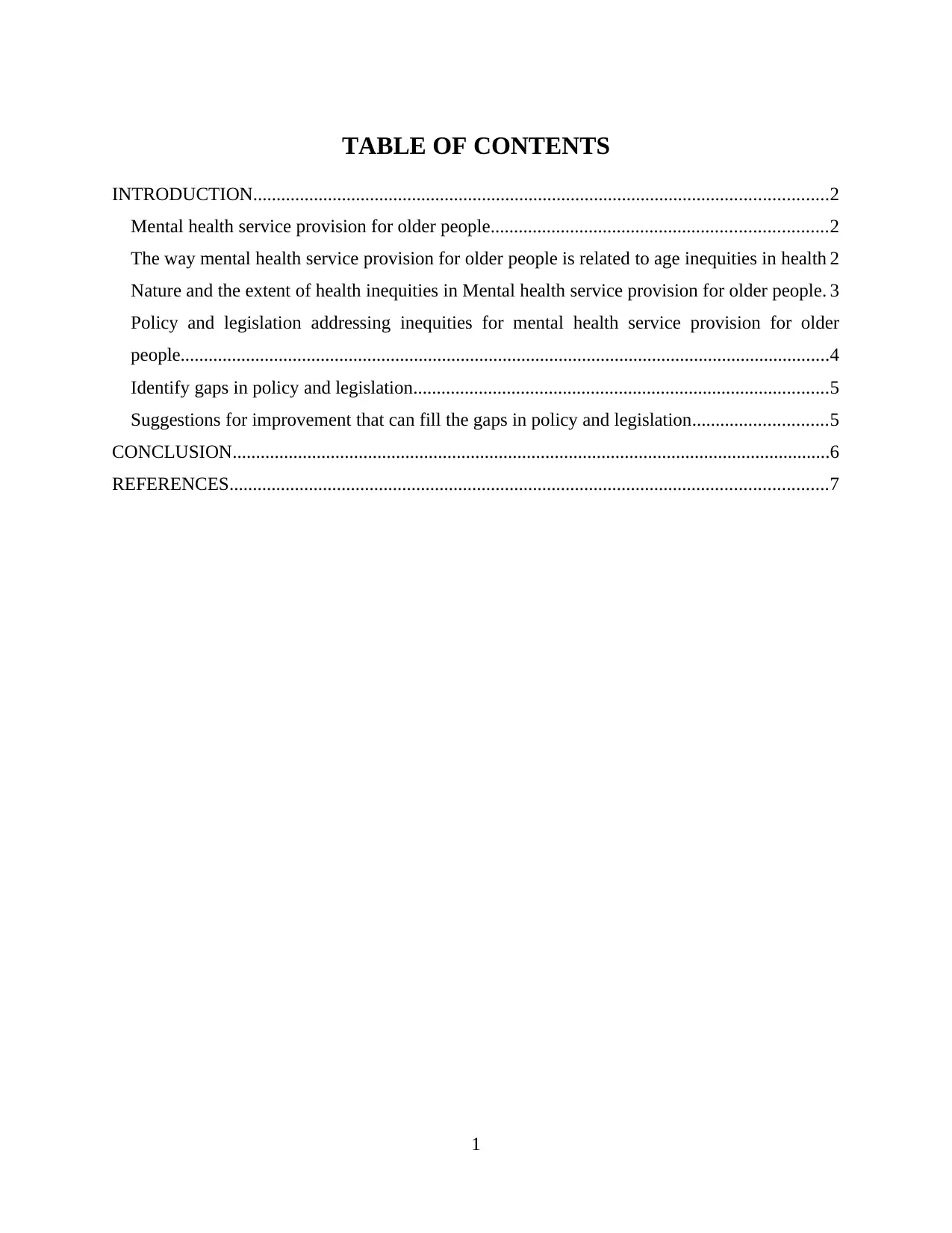
TABLE OF CONTENTS
INTRODUCTION...........................................................................................................................2
Mental health service provision for older people........................................................................2
The way mental health service provision for older people is related to age inequities in health 2
Nature and the extent of health inequities in Mental health service provision for older people. 3
Policy and legislation addressing inequities for mental health service provision for older
people...........................................................................................................................................4
Identify gaps in policy and legislation.........................................................................................5
Suggestions for improvement that can fill the gaps in policy and legislation.............................5
CONCLUSION................................................................................................................................6
REFERENCES................................................................................................................................7
1
INTRODUCTION...........................................................................................................................2
Mental health service provision for older people........................................................................2
The way mental health service provision for older people is related to age inequities in health 2
Nature and the extent of health inequities in Mental health service provision for older people. 3
Policy and legislation addressing inequities for mental health service provision for older
people...........................................................................................................................................4
Identify gaps in policy and legislation.........................................................................................5
Suggestions for improvement that can fill the gaps in policy and legislation.............................5
CONCLUSION................................................................................................................................6
REFERENCES................................................................................................................................7
1
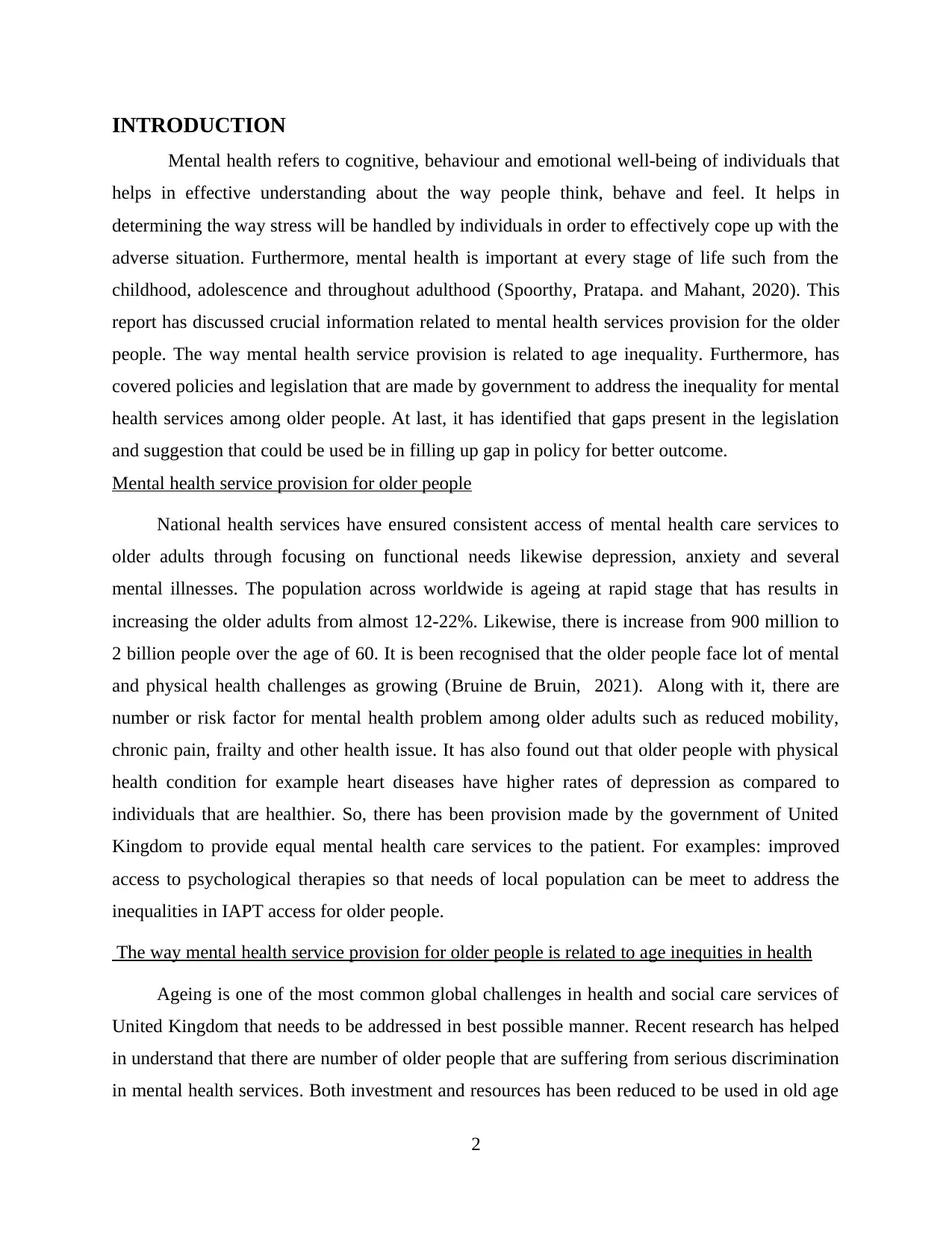
INTRODUCTION
Mental health refers to cognitive, behaviour and emotional well-being of individuals that
helps in effective understanding about the way people think, behave and feel. It helps in
determining the way stress will be handled by individuals in order to effectively cope up with the
adverse situation. Furthermore, mental health is important at every stage of life such from the
childhood, adolescence and throughout adulthood (Spoorthy, Pratapa. and Mahant, 2020). This
report has discussed crucial information related to mental health services provision for the older
people. The way mental health service provision is related to age inequality. Furthermore, has
covered policies and legislation that are made by government to address the inequality for mental
health services among older people. At last, it has identified that gaps present in the legislation
and suggestion that could be used be in filling up gap in policy for better outcome.
Mental health service provision for older people
National health services have ensured consistent access of mental health care services to
older adults through focusing on functional needs likewise depression, anxiety and several
mental illnesses. The population across worldwide is ageing at rapid stage that has results in
increasing the older adults from almost 12-22%. Likewise, there is increase from 900 million to
2 billion people over the age of 60. It is been recognised that the older people face lot of mental
and physical health challenges as growing (Bruine de Bruin, 2021). Along with it, there are
number or risk factor for mental health problem among older adults such as reduced mobility,
chronic pain, frailty and other health issue. It has also found out that older people with physical
health condition for example heart diseases have higher rates of depression as compared to
individuals that are healthier. So, there has been provision made by the government of United
Kingdom to provide equal mental health care services to the patient. For examples: improved
access to psychological therapies so that needs of local population can be meet to address the
inequalities in IAPT access for older people.
The way mental health service provision for older people is related to age inequities in health
Ageing is one of the most common global challenges in health and social care services of
United Kingdom that needs to be addressed in best possible manner. Recent research has helped
in understand that there are number of older people that are suffering from serious discrimination
in mental health services. Both investment and resources has been reduced to be used in old age
2
Mental health refers to cognitive, behaviour and emotional well-being of individuals that
helps in effective understanding about the way people think, behave and feel. It helps in
determining the way stress will be handled by individuals in order to effectively cope up with the
adverse situation. Furthermore, mental health is important at every stage of life such from the
childhood, adolescence and throughout adulthood (Spoorthy, Pratapa. and Mahant, 2020). This
report has discussed crucial information related to mental health services provision for the older
people. The way mental health service provision is related to age inequality. Furthermore, has
covered policies and legislation that are made by government to address the inequality for mental
health services among older people. At last, it has identified that gaps present in the legislation
and suggestion that could be used be in filling up gap in policy for better outcome.
Mental health service provision for older people
National health services have ensured consistent access of mental health care services to
older adults through focusing on functional needs likewise depression, anxiety and several
mental illnesses. The population across worldwide is ageing at rapid stage that has results in
increasing the older adults from almost 12-22%. Likewise, there is increase from 900 million to
2 billion people over the age of 60. It is been recognised that the older people face lot of mental
and physical health challenges as growing (Bruine de Bruin, 2021). Along with it, there are
number or risk factor for mental health problem among older adults such as reduced mobility,
chronic pain, frailty and other health issue. It has also found out that older people with physical
health condition for example heart diseases have higher rates of depression as compared to
individuals that are healthier. So, there has been provision made by the government of United
Kingdom to provide equal mental health care services to the patient. For examples: improved
access to psychological therapies so that needs of local population can be meet to address the
inequalities in IAPT access for older people.
The way mental health service provision for older people is related to age inequities in health
Ageing is one of the most common global challenges in health and social care services of
United Kingdom that needs to be addressed in best possible manner. Recent research has helped
in understand that there are number of older people that are suffering from serious discrimination
in mental health services. Both investment and resources has been reduced to be used in old age
2
⊘ This is a preview!⊘
Do you want full access?
Subscribe today to unlock all pages.

Trusted by 1+ million students worldwide
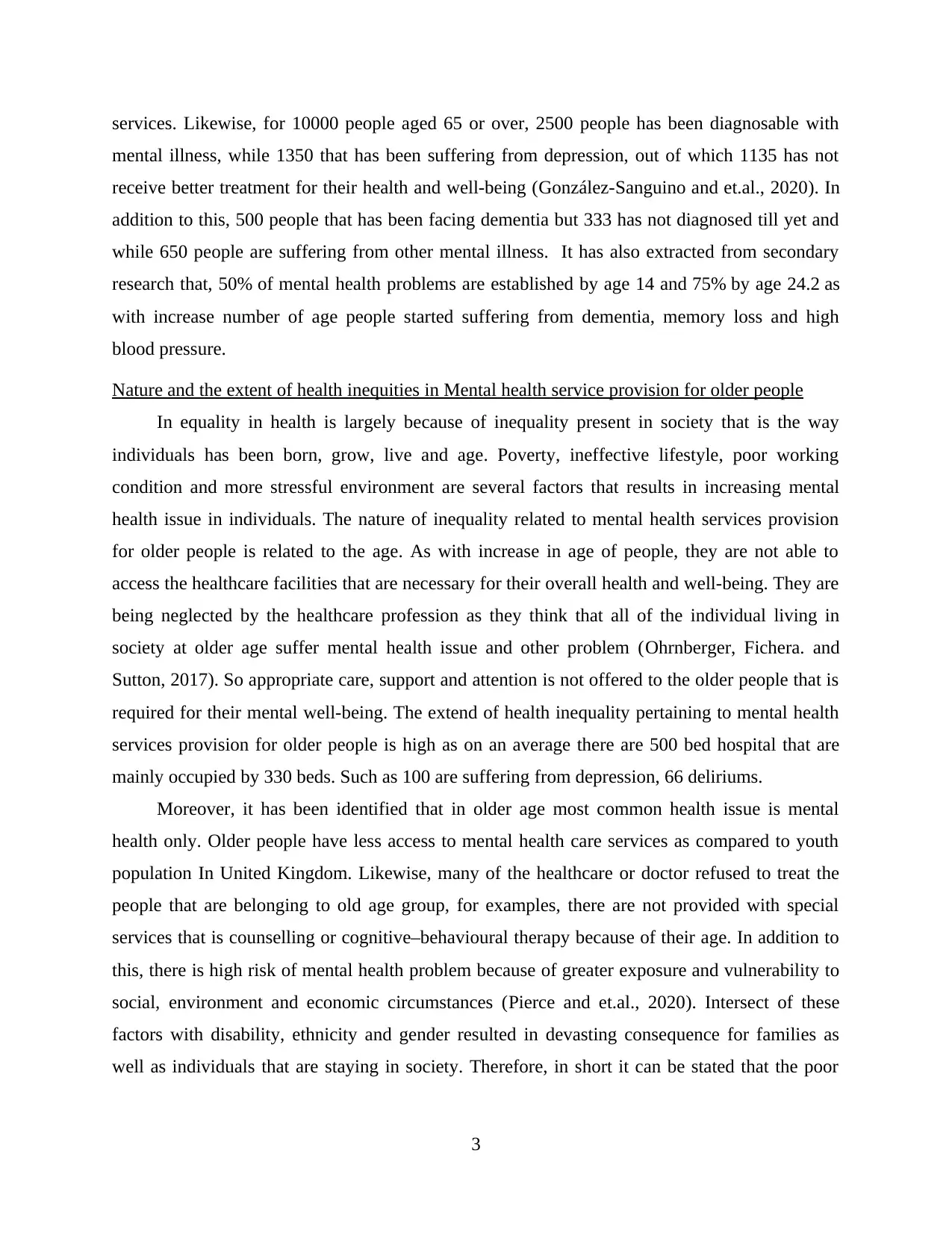
services. Likewise, for 10000 people aged 65 or over, 2500 people has been diagnosable with
mental illness, while 1350 that has been suffering from depression, out of which 1135 has not
receive better treatment for their health and well-being (González-Sanguino and et.al., 2020). In
addition to this, 500 people that has been facing dementia but 333 has not diagnosed till yet and
while 650 people are suffering from other mental illness. It has also extracted from secondary
research that, 50% of mental health problems are established by age 14 and 75% by age 24.2 as
with increase number of age people started suffering from dementia, memory loss and high
blood pressure.
Nature and the extent of health inequities in Mental health service provision for older people
In equality in health is largely because of inequality present in society that is the way
individuals has been born, grow, live and age. Poverty, ineffective lifestyle, poor working
condition and more stressful environment are several factors that results in increasing mental
health issue in individuals. The nature of inequality related to mental health services provision
for older people is related to the age. As with increase in age of people, they are not able to
access the healthcare facilities that are necessary for their overall health and well-being. They are
being neglected by the healthcare profession as they think that all of the individual living in
society at older age suffer mental health issue and other problem (Ohrnberger, Fichera. and
Sutton, 2017). So appropriate care, support and attention is not offered to the older people that is
required for their mental well-being. The extend of health inequality pertaining to mental health
services provision for older people is high as on an average there are 500 bed hospital that are
mainly occupied by 330 beds. Such as 100 are suffering from depression, 66 deliriums.
Moreover, it has been identified that in older age most common health issue is mental
health only. Older people have less access to mental health care services as compared to youth
population In United Kingdom. Likewise, many of the healthcare or doctor refused to treat the
people that are belonging to old age group, for examples, there are not provided with special
services that is counselling or cognitive–behavioural therapy because of their age. In addition to
this, there is high risk of mental health problem because of greater exposure and vulnerability to
social, environment and economic circumstances (Pierce and et.al., 2020). Intersect of these
factors with disability, ethnicity and gender resulted in devasting consequence for families as
well as individuals that are staying in society. Therefore, in short it can be stated that the poor
3
mental illness, while 1350 that has been suffering from depression, out of which 1135 has not
receive better treatment for their health and well-being (González-Sanguino and et.al., 2020). In
addition to this, 500 people that has been facing dementia but 333 has not diagnosed till yet and
while 650 people are suffering from other mental illness. It has also extracted from secondary
research that, 50% of mental health problems are established by age 14 and 75% by age 24.2 as
with increase number of age people started suffering from dementia, memory loss and high
blood pressure.
Nature and the extent of health inequities in Mental health service provision for older people
In equality in health is largely because of inequality present in society that is the way
individuals has been born, grow, live and age. Poverty, ineffective lifestyle, poor working
condition and more stressful environment are several factors that results in increasing mental
health issue in individuals. The nature of inequality related to mental health services provision
for older people is related to the age. As with increase in age of people, they are not able to
access the healthcare facilities that are necessary for their overall health and well-being. They are
being neglected by the healthcare profession as they think that all of the individual living in
society at older age suffer mental health issue and other problem (Ohrnberger, Fichera. and
Sutton, 2017). So appropriate care, support and attention is not offered to the older people that is
required for their mental well-being. The extend of health inequality pertaining to mental health
services provision for older people is high as on an average there are 500 bed hospital that are
mainly occupied by 330 beds. Such as 100 are suffering from depression, 66 deliriums.
Moreover, it has been identified that in older age most common health issue is mental
health only. Older people have less access to mental health care services as compared to youth
population In United Kingdom. Likewise, many of the healthcare or doctor refused to treat the
people that are belonging to old age group, for examples, there are not provided with special
services that is counselling or cognitive–behavioural therapy because of their age. In addition to
this, there is high risk of mental health problem because of greater exposure and vulnerability to
social, environment and economic circumstances (Pierce and et.al., 2020). Intersect of these
factors with disability, ethnicity and gender resulted in devasting consequence for families as
well as individuals that are staying in society. Therefore, in short it can be stated that the poor
3
Paraphrase This Document
Need a fresh take? Get an instant paraphrase of this document with our AI Paraphraser
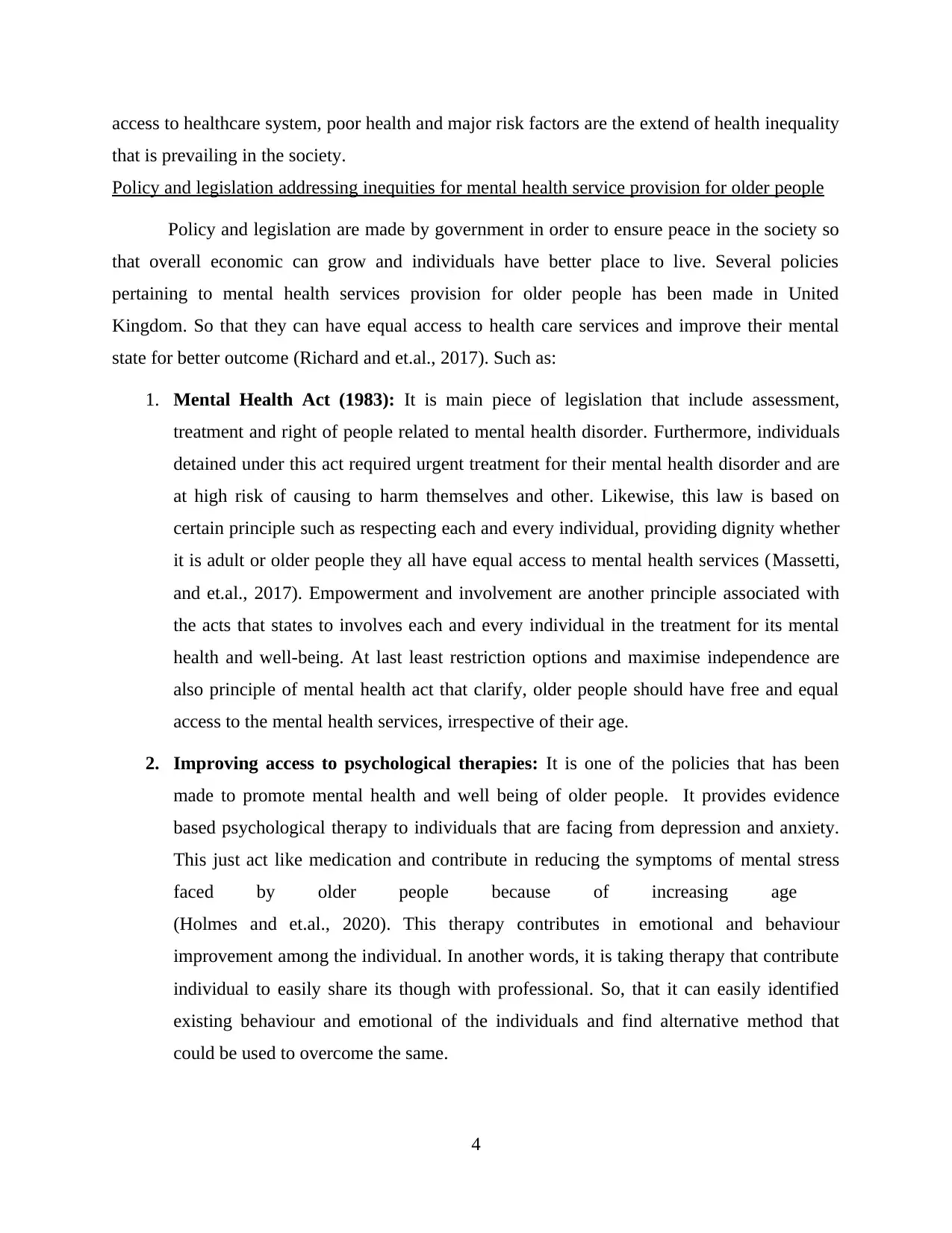
access to healthcare system, poor health and major risk factors are the extend of health inequality
that is prevailing in the society.
Policy and legislation addressing inequities for mental health service provision for older people
Policy and legislation are made by government in order to ensure peace in the society so
that overall economic can grow and individuals have better place to live. Several policies
pertaining to mental health services provision for older people has been made in United
Kingdom. So that they can have equal access to health care services and improve their mental
state for better outcome (Richard and et.al., 2017). Such as:
1. Mental Health Act (1983): It is main piece of legislation that include assessment,
treatment and right of people related to mental health disorder. Furthermore, individuals
detained under this act required urgent treatment for their mental health disorder and are
at high risk of causing to harm themselves and other. Likewise, this law is based on
certain principle such as respecting each and every individual, providing dignity whether
it is adult or older people they all have equal access to mental health services (Massetti,
and et.al., 2017). Empowerment and involvement are another principle associated with
the acts that states to involves each and every individual in the treatment for its mental
health and well-being. At last least restriction options and maximise independence are
also principle of mental health act that clarify, older people should have free and equal
access to the mental health services, irrespective of their age.
2. Improving access to psychological therapies: It is one of the policies that has been
made to promote mental health and well being of older people. It provides evidence
based psychological therapy to individuals that are facing from depression and anxiety.
This just act like medication and contribute in reducing the symptoms of mental stress
faced by older people because of increasing age
(Holmes and et.al., 2020). This therapy contributes in emotional and behaviour
improvement among the individual. In another words, it is taking therapy that contribute
individual to easily share its though with professional. So, that it can easily identified
existing behaviour and emotional of the individuals and find alternative method that
could be used to overcome the same.
4
that is prevailing in the society.
Policy and legislation addressing inequities for mental health service provision for older people
Policy and legislation are made by government in order to ensure peace in the society so
that overall economic can grow and individuals have better place to live. Several policies
pertaining to mental health services provision for older people has been made in United
Kingdom. So that they can have equal access to health care services and improve their mental
state for better outcome (Richard and et.al., 2017). Such as:
1. Mental Health Act (1983): It is main piece of legislation that include assessment,
treatment and right of people related to mental health disorder. Furthermore, individuals
detained under this act required urgent treatment for their mental health disorder and are
at high risk of causing to harm themselves and other. Likewise, this law is based on
certain principle such as respecting each and every individual, providing dignity whether
it is adult or older people they all have equal access to mental health services (Massetti,
and et.al., 2017). Empowerment and involvement are another principle associated with
the acts that states to involves each and every individual in the treatment for its mental
health and well-being. At last least restriction options and maximise independence are
also principle of mental health act that clarify, older people should have free and equal
access to the mental health services, irrespective of their age.
2. Improving access to psychological therapies: It is one of the policies that has been
made to promote mental health and well being of older people. It provides evidence
based psychological therapy to individuals that are facing from depression and anxiety.
This just act like medication and contribute in reducing the symptoms of mental stress
faced by older people because of increasing age
(Holmes and et.al., 2020). This therapy contributes in emotional and behaviour
improvement among the individual. In another words, it is taking therapy that contribute
individual to easily share its though with professional. So, that it can easily identified
existing behaviour and emotional of the individuals and find alternative method that
could be used to overcome the same.
4
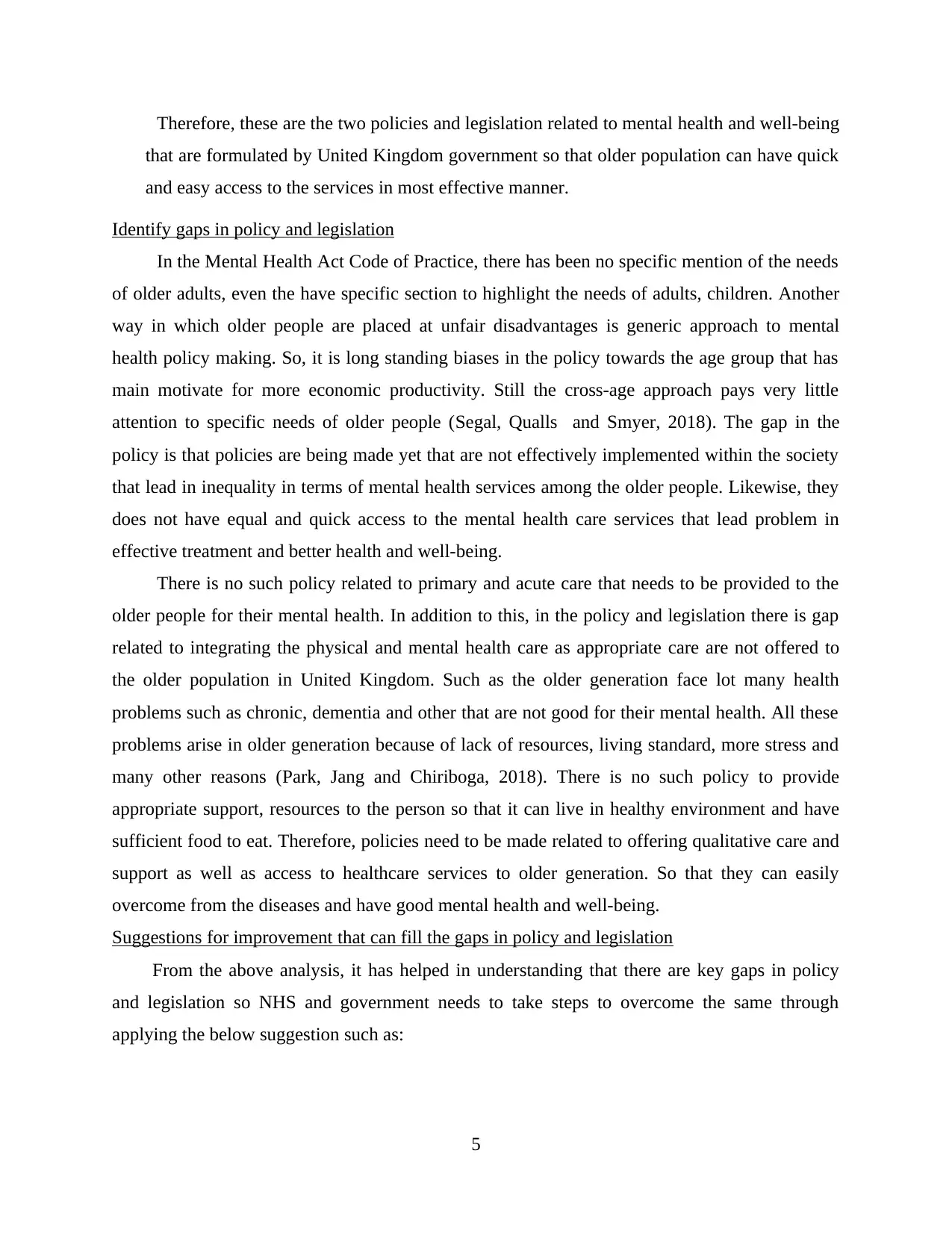
Therefore, these are the two policies and legislation related to mental health and well-being
that are formulated by United Kingdom government so that older population can have quick
and easy access to the services in most effective manner.
Identify gaps in policy and legislation
In the Mental Health Act Code of Practice, there has been no specific mention of the needs
of older adults, even the have specific section to highlight the needs of adults, children. Another
way in which older people are placed at unfair disadvantages is generic approach to mental
health policy making. So, it is long standing biases in the policy towards the age group that has
main motivate for more economic productivity. Still the cross-age approach pays very little
attention to specific needs of older people (Segal, Qualls and Smyer, 2018). The gap in the
policy is that policies are being made yet that are not effectively implemented within the society
that lead in inequality in terms of mental health services among the older people. Likewise, they
does not have equal and quick access to the mental health care services that lead problem in
effective treatment and better health and well-being.
There is no such policy related to primary and acute care that needs to be provided to the
older people for their mental health. In addition to this, in the policy and legislation there is gap
related to integrating the physical and mental health care as appropriate care are not offered to
the older population in United Kingdom. Such as the older generation face lot many health
problems such as chronic, dementia and other that are not good for their mental health. All these
problems arise in older generation because of lack of resources, living standard, more stress and
many other reasons (Park, Jang and Chiriboga, 2018). There is no such policy to provide
appropriate support, resources to the person so that it can live in healthy environment and have
sufficient food to eat. Therefore, policies need to be made related to offering qualitative care and
support as well as access to healthcare services to older generation. So that they can easily
overcome from the diseases and have good mental health and well-being.
Suggestions for improvement that can fill the gaps in policy and legislation
From the above analysis, it has helped in understanding that there are key gaps in policy
and legislation so NHS and government needs to take steps to overcome the same through
applying the below suggestion such as:
5
that are formulated by United Kingdom government so that older population can have quick
and easy access to the services in most effective manner.
Identify gaps in policy and legislation
In the Mental Health Act Code of Practice, there has been no specific mention of the needs
of older adults, even the have specific section to highlight the needs of adults, children. Another
way in which older people are placed at unfair disadvantages is generic approach to mental
health policy making. So, it is long standing biases in the policy towards the age group that has
main motivate for more economic productivity. Still the cross-age approach pays very little
attention to specific needs of older people (Segal, Qualls and Smyer, 2018). The gap in the
policy is that policies are being made yet that are not effectively implemented within the society
that lead in inequality in terms of mental health services among the older people. Likewise, they
does not have equal and quick access to the mental health care services that lead problem in
effective treatment and better health and well-being.
There is no such policy related to primary and acute care that needs to be provided to the
older people for their mental health. In addition to this, in the policy and legislation there is gap
related to integrating the physical and mental health care as appropriate care are not offered to
the older population in United Kingdom. Such as the older generation face lot many health
problems such as chronic, dementia and other that are not good for their mental health. All these
problems arise in older generation because of lack of resources, living standard, more stress and
many other reasons (Park, Jang and Chiriboga, 2018). There is no such policy to provide
appropriate support, resources to the person so that it can live in healthy environment and have
sufficient food to eat. Therefore, policies need to be made related to offering qualitative care and
support as well as access to healthcare services to older generation. So that they can easily
overcome from the diseases and have good mental health and well-being.
Suggestions for improvement that can fill the gaps in policy and legislation
From the above analysis, it has helped in understanding that there are key gaps in policy
and legislation so NHS and government needs to take steps to overcome the same through
applying the below suggestion such as:
5
⊘ This is a preview!⊘
Do you want full access?
Subscribe today to unlock all pages.

Trusted by 1+ million students worldwide
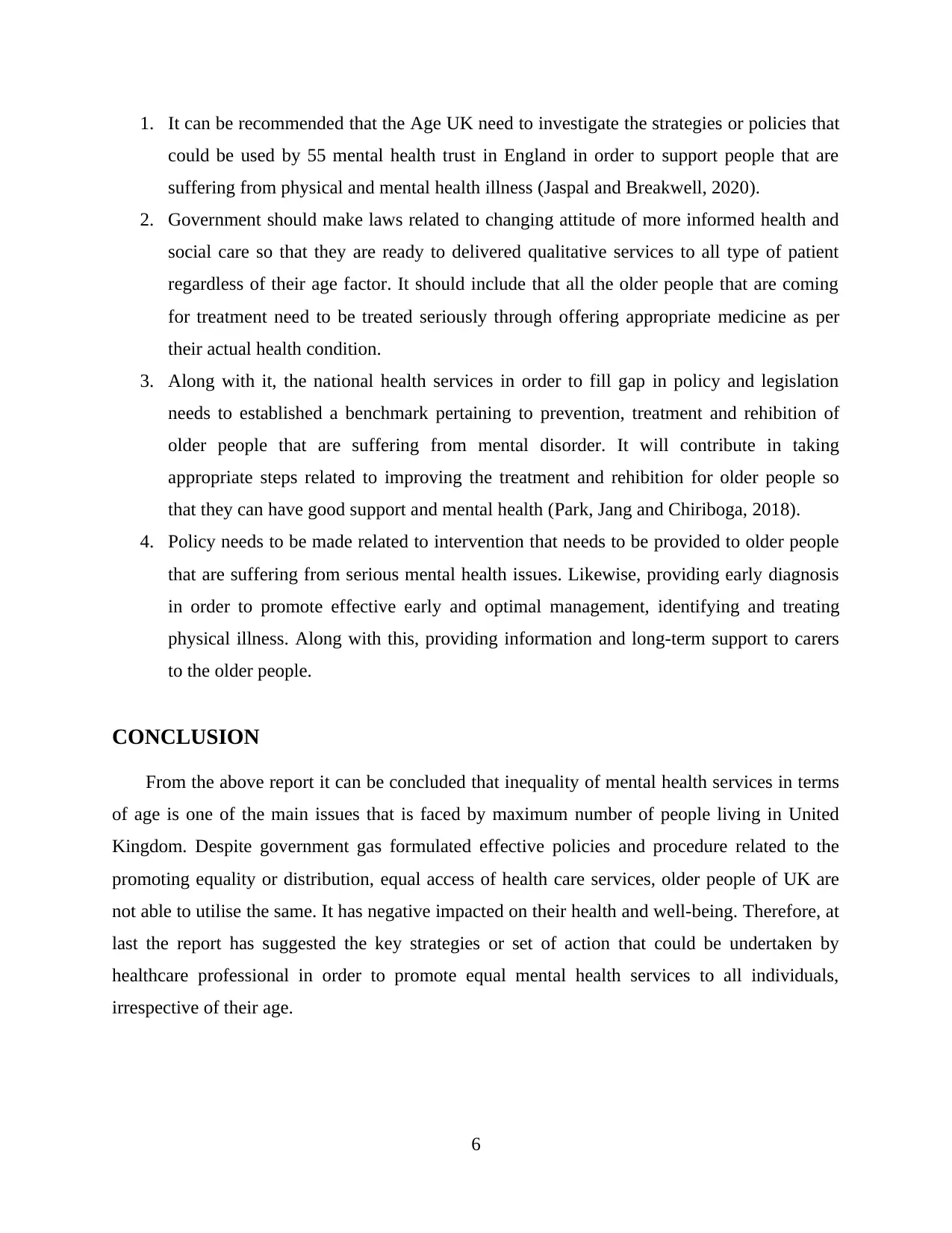
1. It can be recommended that the Age UK need to investigate the strategies or policies that
could be used by 55 mental health trust in England in order to support people that are
suffering from physical and mental health illness (Jaspal and Breakwell, 2020).
2. Government should make laws related to changing attitude of more informed health and
social care so that they are ready to delivered qualitative services to all type of patient
regardless of their age factor. It should include that all the older people that are coming
for treatment need to be treated seriously through offering appropriate medicine as per
their actual health condition.
3. Along with it, the national health services in order to fill gap in policy and legislation
needs to established a benchmark pertaining to prevention, treatment and rehibition of
older people that are suffering from mental disorder. It will contribute in taking
appropriate steps related to improving the treatment and rehibition for older people so
that they can have good support and mental health (Park, Jang and Chiriboga, 2018).
4. Policy needs to be made related to intervention that needs to be provided to older people
that are suffering from serious mental health issues. Likewise, providing early diagnosis
in order to promote effective early and optimal management, identifying and treating
physical illness. Along with this, providing information and long-term support to carers
to the older people.
CONCLUSION
From the above report it can be concluded that inequality of mental health services in terms
of age is one of the main issues that is faced by maximum number of people living in United
Kingdom. Despite government gas formulated effective policies and procedure related to the
promoting equality or distribution, equal access of health care services, older people of UK are
not able to utilise the same. It has negative impacted on their health and well-being. Therefore, at
last the report has suggested the key strategies or set of action that could be undertaken by
healthcare professional in order to promote equal mental health services to all individuals,
irrespective of their age.
6
could be used by 55 mental health trust in England in order to support people that are
suffering from physical and mental health illness (Jaspal and Breakwell, 2020).
2. Government should make laws related to changing attitude of more informed health and
social care so that they are ready to delivered qualitative services to all type of patient
regardless of their age factor. It should include that all the older people that are coming
for treatment need to be treated seriously through offering appropriate medicine as per
their actual health condition.
3. Along with it, the national health services in order to fill gap in policy and legislation
needs to established a benchmark pertaining to prevention, treatment and rehibition of
older people that are suffering from mental disorder. It will contribute in taking
appropriate steps related to improving the treatment and rehibition for older people so
that they can have good support and mental health (Park, Jang and Chiriboga, 2018).
4. Policy needs to be made related to intervention that needs to be provided to older people
that are suffering from serious mental health issues. Likewise, providing early diagnosis
in order to promote effective early and optimal management, identifying and treating
physical illness. Along with this, providing information and long-term support to carers
to the older people.
CONCLUSION
From the above report it can be concluded that inequality of mental health services in terms
of age is one of the main issues that is faced by maximum number of people living in United
Kingdom. Despite government gas formulated effective policies and procedure related to the
promoting equality or distribution, equal access of health care services, older people of UK are
not able to utilise the same. It has negative impacted on their health and well-being. Therefore, at
last the report has suggested the key strategies or set of action that could be undertaken by
healthcare professional in order to promote equal mental health services to all individuals,
irrespective of their age.
6
Paraphrase This Document
Need a fresh take? Get an instant paraphrase of this document with our AI Paraphraser
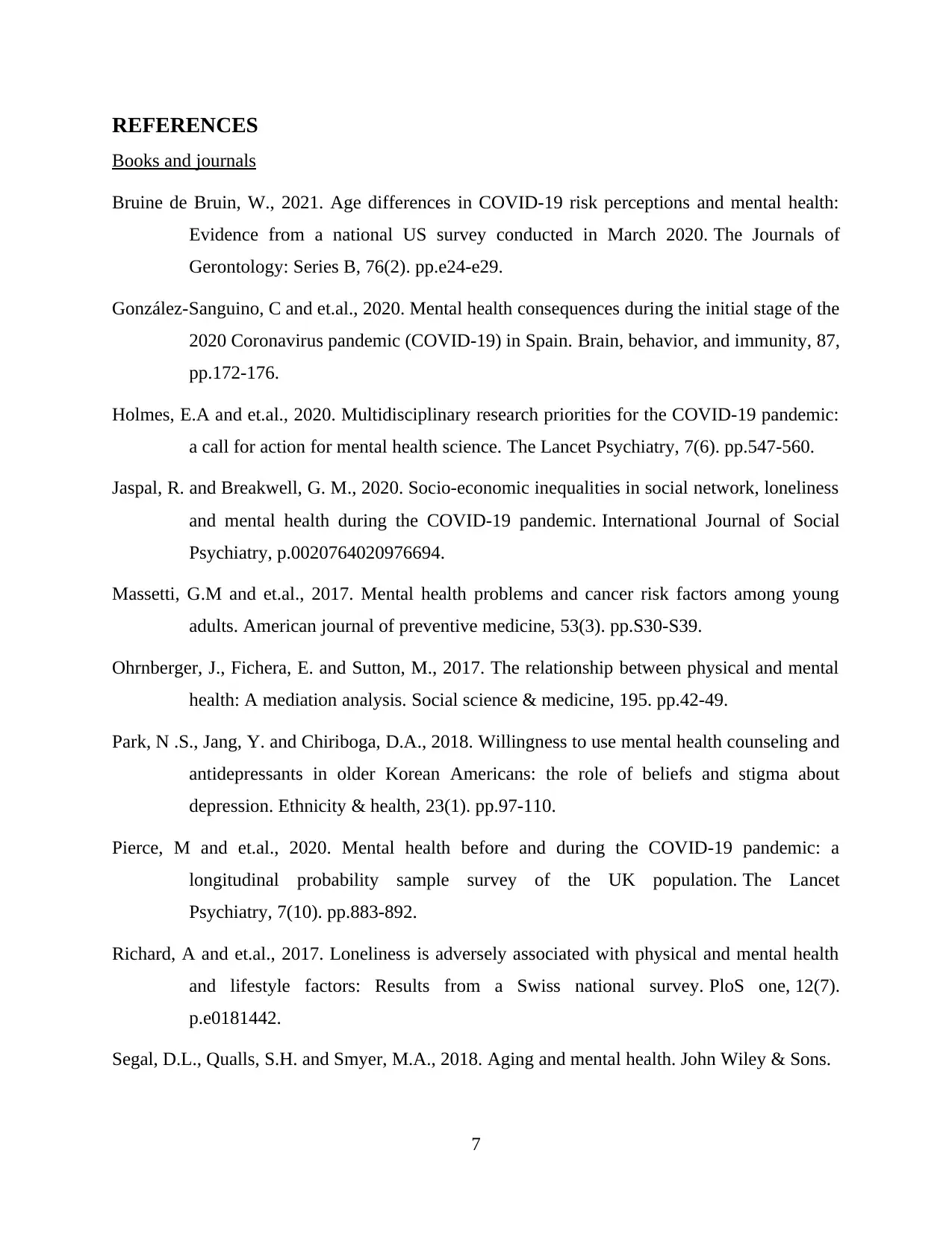
REFERENCES
Books and journals
Bruine de Bruin, W., 2021. Age differences in COVID-19 risk perceptions and mental health:
Evidence from a national US survey conducted in March 2020. The Journals of
Gerontology: Series B, 76(2). pp.e24-e29.
González-Sanguino, C and et.al., 2020. Mental health consequences during the initial stage of the
2020 Coronavirus pandemic (COVID-19) in Spain. Brain, behavior, and immunity, 87,
pp.172-176.
Holmes, E.A and et.al., 2020. Multidisciplinary research priorities for the COVID-19 pandemic:
a call for action for mental health science. The Lancet Psychiatry, 7(6). pp.547-560.
Jaspal, R. and Breakwell, G. M., 2020. Socio-economic inequalities in social network, loneliness
and mental health during the COVID-19 pandemic. International Journal of Social
Psychiatry, p.0020764020976694.
Massetti, G.M and et.al., 2017. Mental health problems and cancer risk factors among young
adults. American journal of preventive medicine, 53(3). pp.S30-S39.
Ohrnberger, J., Fichera, E. and Sutton, M., 2017. The relationship between physical and mental
health: A mediation analysis. Social science & medicine, 195. pp.42-49.
Park, N .S., Jang, Y. and Chiriboga, D.A., 2018. Willingness to use mental health counseling and
antidepressants in older Korean Americans: the role of beliefs and stigma about
depression. Ethnicity & health, 23(1). pp.97-110.
Pierce, M and et.al., 2020. Mental health before and during the COVID-19 pandemic: a
longitudinal probability sample survey of the UK population. The Lancet
Psychiatry, 7(10). pp.883-892.
Richard, A and et.al., 2017. Loneliness is adversely associated with physical and mental health
and lifestyle factors: Results from a Swiss national survey. PloS one, 12(7).
p.e0181442.
Segal, D.L., Qualls, S.H. and Smyer, M.A., 2018. Aging and mental health. John Wiley & Sons.
7
Books and journals
Bruine de Bruin, W., 2021. Age differences in COVID-19 risk perceptions and mental health:
Evidence from a national US survey conducted in March 2020. The Journals of
Gerontology: Series B, 76(2). pp.e24-e29.
González-Sanguino, C and et.al., 2020. Mental health consequences during the initial stage of the
2020 Coronavirus pandemic (COVID-19) in Spain. Brain, behavior, and immunity, 87,
pp.172-176.
Holmes, E.A and et.al., 2020. Multidisciplinary research priorities for the COVID-19 pandemic:
a call for action for mental health science. The Lancet Psychiatry, 7(6). pp.547-560.
Jaspal, R. and Breakwell, G. M., 2020. Socio-economic inequalities in social network, loneliness
and mental health during the COVID-19 pandemic. International Journal of Social
Psychiatry, p.0020764020976694.
Massetti, G.M and et.al., 2017. Mental health problems and cancer risk factors among young
adults. American journal of preventive medicine, 53(3). pp.S30-S39.
Ohrnberger, J., Fichera, E. and Sutton, M., 2017. The relationship between physical and mental
health: A mediation analysis. Social science & medicine, 195. pp.42-49.
Park, N .S., Jang, Y. and Chiriboga, D.A., 2018. Willingness to use mental health counseling and
antidepressants in older Korean Americans: the role of beliefs and stigma about
depression. Ethnicity & health, 23(1). pp.97-110.
Pierce, M and et.al., 2020. Mental health before and during the COVID-19 pandemic: a
longitudinal probability sample survey of the UK population. The Lancet
Psychiatry, 7(10). pp.883-892.
Richard, A and et.al., 2017. Loneliness is adversely associated with physical and mental health
and lifestyle factors: Results from a Swiss national survey. PloS one, 12(7).
p.e0181442.
Segal, D.L., Qualls, S.H. and Smyer, M.A., 2018. Aging and mental health. John Wiley & Sons.
7

Spoorthy, M. S., Pratapa, S. K. and Mahant, S., 2020. Mental health problems faced by
healthcare workers due to the COVID-19 pandemic–A review. Asian journal of
psychiatry, 51. p.102119.
8
healthcare workers due to the COVID-19 pandemic–A review. Asian journal of
psychiatry, 51. p.102119.
8
⊘ This is a preview!⊘
Do you want full access?
Subscribe today to unlock all pages.

Trusted by 1+ million students worldwide
1 out of 9
Related Documents
Your All-in-One AI-Powered Toolkit for Academic Success.
+13062052269
info@desklib.com
Available 24*7 on WhatsApp / Email
![[object Object]](/_next/static/media/star-bottom.7253800d.svg)
Unlock your academic potential
Copyright © 2020–2026 A2Z Services. All Rights Reserved. Developed and managed by ZUCOL.




